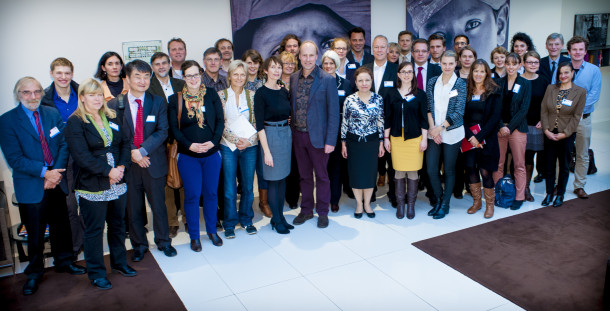
Metropolis Initiative launches charter for climate change adaptation
No regrets - Pre-acting and Adapting to Climate Change in Cities (October, 14-15 2013)
Background paper
“So-called “no regret”-measures should be at the heart of this approach, as is done in Berlin, which refers to measures which already today improve the quality of life and sustainability of the functioning urban structures independently of the actual occurrence of the projected climatic developments.”
Paul James: Adapting to Climate Change
“If the different social domains, or the combined socio-environmental ‘systems’, are considered the locus for climate change adaptation, a clear understanding of the system under consideration is necessary for defining effective goals and devising actions that will work towards these goals within the limits and opportunities provided by that system.”
Climate adaptation in cities - some theses
Christian Gaebler: Welcome address and presentation of the dialogue concept
 Christian Gaebler, State Secretary at the Senate Department for Urban Development and the Environment Berlin
Christian Gaebler, State Secretary at the Senate Department for Urban Development and the Environment Berlin
"As a result of predicted climate change, as soon as in fifty years from now, our cities will offer less good living conditions than at the present time – unless we prepare for these changes... climate adaptation cannot be carried through by municipal politics and administration on their own. These institutions can put the framework in place – but adapting to climate change is a task for the whole of society. It requires joint action by all the players.”
Download Christian Gaebler Presentation here
Galina Churkina: Adaptation to Climate Change in Cities
 Dr. Galina Churkina, Institute for Advanced Sustainability Studies (IASS) in Potsdam
Dr. Galina Churkina, Institute for Advanced Sustainability Studies (IASS) in Potsdam
“Increasing air temperatures and changes in rainfall patterns are the two manifestations of climate change, to which city dwellers are especially vulnerable. Increasing air temperatures have direct implications for the health of urban dwellers, but also indirectly cause sea level rise and endanger coastal cities.”
 Paula Verhoeven, Director Sustainabiklioty and Climate Change, City of Rotterdam
Paula Verhoeven, Director Sustainabiklioty and Climate Change, City of Rotterdam
Floris Boogard: Water supply and disposal
 Prof. Floris Boogaard, Hanze University of Applied Sciences Groningen
Prof. Floris Boogaard, Hanze University of Applied Sciences Groningen
Carlo Becker: Spatial planning and green areas
 Dr. Carlo Becker, Professor at Brandenburg University of Technology Cottbus
Dr. Carlo Becker, Professor at Brandenburg University of Technology Cottbus
“Climate adaptation is a task for the future which cannot be imposed through planning from above, rather it must be lived and tested at all levels. For this to be achieved, the many actors in cities and urban society must be involved. Urban development can also raise issues, provide direction and lead by good example. Thought must be given in advance to key themes and these, in turn, must be underpinned by strategies.”
YoungSoo Choi: Buildings and energetic rehabilitation
 Dr. YoungSoo Choi, Team Leader of Green Energy Policy Team, Green Energy Department, Seoul Metropolitan Government
Dr. YoungSoo Choi, Team Leader of Green Energy Policy Team, Green Energy Department, Seoul Metropolitan Government
“In Seoul, we have engaged the citizens into policy making from the very beginning. We included the opinions and suggestions of many businessmen and experts not only from the public sector. Our programme aims at reducing energy consumption to mitigate climate change and ultimately to adapt to climate change.”
Main results
"Mitigation remains a central component in any municipal climate policy. However, it must be supplemented/augmented by adaptation measures. Even if the two degree C limit goal can be maintained, environmental conditions will be considerably altered. Furthermore, it is doubtful as to whether this objective can be achieved."
 Thanks to the “Stiftung Deutsche Klassenlotterie Berlin” for supporting the event.
Thanks to the “Stiftung Deutsche Klassenlotterie Berlin” for supporting the event.

